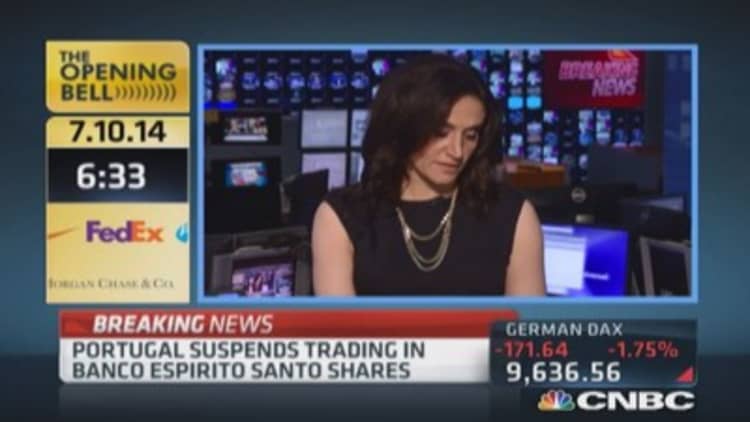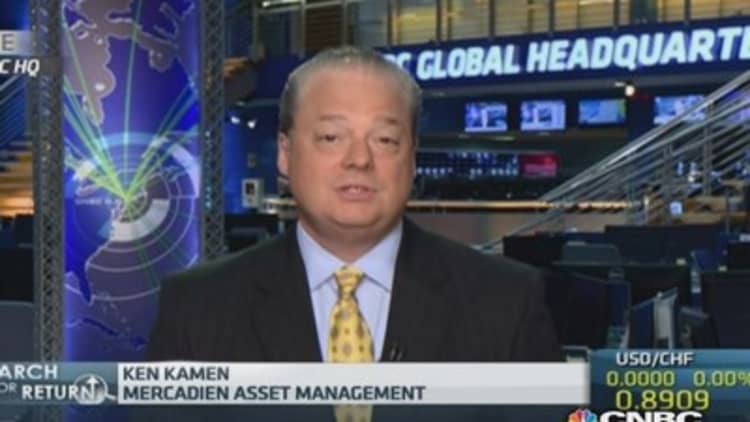
Global equity markets slumped Thursday as fears over the stability of Portugal's banking industry compounded concerns over U.S. economic growth and weaker-than-expected data from the rest of Europe and China.
U.S. markets reflected the world's jitters when they opened Thursday with the Dow Jones down 0.9 percent at 16,831.84, the off by 18.75 points at 1,954.88 and the Nasdaq 1.44 percent lower at 4,355.43. Stocks did manage, however, to recoup much of the losses that came in the first hour of trading.
In Europe, it was the so-called peripheral countries of the euro zone—Spain, Italy and Portugal—that were the major underperformers, with Portugal's PSI 20 ending the day over 4 percent lower and Italy's FTSE MIB down 1.9 percent.
Volatility climbed higher with the VSTOXX index, a gauge of fear in Europe markets, rising to 17.64 earlier on Wednesday, before paring gains. At Europe close it was 10 percent higher than on Wednesday.
Read MoreDovish Fed pushes back on rate hike speculation
Concerns over the governance and health of one of Portugal's leading banks triggered a selloff across the rest of Europe during morning trade. Shares in Banco Espirito Santo were reportedly halted after they lost almost a fifth of their value, and Espirito Santo Financial Group dropped 8.85 percent amid concerns about the health of the financial group.
This weighed down the region's other lenders. In Italy, shares of Banco Popolare fell 2.8 percent and Unicredit lost 2.5 percent.
"One thing we can almost all agree on is that there probably is some sort of bubble in European peripherals and it could have a destabilizing effect," Jim Iuorio, managing director at TJM Institutional Services, told CNBC.
The euro zone's periphery had enjoyed a significant bounce-back over the past few months with the yields on some Spanish and Portuguese bonds beating those of even the U.S.
"Are Portuguese and Greek bonds mispriced?" asked Iuorio, "Of course they are, and it's just a function of every central bank throwing tons of money into this system."
The problems in Portugal hit the rest of Europe, which was already dealing with weaker-than-expected data continuing to plague the bloc's stuttering recovery from its sovereign debt crisis.
Italy's industrial output showed an unexpected monthly drop of 1.2 percent in May. Meanwhile in France, new figures showed industrial production plunged in May and inflation rose by just 0.6 percent, its lowest level since November 2009.
"We're seeing the markets starting to unwind a little bit right now," Todd Horwitz, author and founder of Averagejoeoptions.com, told CNBC on Thursday.
"The U.S. earnings season (which began in earnest this week) will go a long way towards showing us that we don't have growth," he said. He added that earlier this year there were "warning signs" that the markets are beginning to cool with more money flowing into defensive utility stocks.
Jasper Lawler, a market analyst at CMC Markets warned of a "big drop" across Wall Street with equity valuation concerns re-emerging. This comes after stocks climbed on Wednesday as traders digested minutes from the Federal Open Market Committee that noted an improving economy and labor market.
"Companies now need to justify all-time-high stock prices, a reiteration of the same from the Fed hasn't proved enough to dispel concerns," Lawler said in a morning research note.
Read MoreChina trade picture improves, but data underwhelm
"In the light of recent regulatory problems for banks, earnings from Wells Fargo tomorrow will be a potential tipping point."

In Asia, stocks traded mixed following weak Chinese trade data. Exports rose 7.2 percent on year, missing estimates for a 10.6 percent increase. Imports rose 5.5 percent, against expectations for a 5.8 percent increase, leaving the country with a $31.6 billion trade surplus.



